A list of characters that are friends to the Ducks found in Disney's Disney Ducks Comic Universe.
Click here to return to the main list.
- Click here to go to the main characters.
- Click here to go to the extended Duck family list.
- Click here to go to the antagonist list.
- Click here to go to the subseries character list.
- Click here for more options.
Keep in mind that since the characters and series have been around for so long, whether a character displays certain traits or not in any given story largely depends on the artist, the writer, or the time period.
Main friends
Gyro Gearloose

Duckburg's local inventor, who frequently works on strange and often useless inventions that have a tendency to end up in the wrong hands. Donald and Scrooge are his friends and his most frequent customers.
- Alliterative Name: Gyro Gearloose.
- Arch-Enemy: Several older stories feature Gyro and criminal inventor Emil Eagle as archenemies. A number of recent stories have instead depicted Gyro and Intellectual-176 (the Gadgeteer Genius of the Beagle Boys) as archenemies.
- Art Evolution: Gyro was VERY fat
 ◊ in his early years, contrasting his established look as a scrawny inventor.
◊ in his early years, contrasting his established look as a scrawny inventor. - Ascended Extra: Gyro was created for the story Gladstone's Terrible Secret (May, 1952), where he interacts with Gladstone Gander for only a few panels. Carl Barks decided that the character had potential and added him as a supporting character to Donald, starting with the stories The Think Box Bollix (June, 1952) and Hobblin' Goblins (November, 1952), where Gyro has a much more substantial role. Other Disney writers, in both the United States and Italy, quickly started writing stories involving Gyro. Trapped Lightning (March, 1956) was the first of many stories where Gyro himself was the protagonist. Over the years Gyro has starred in hundreds of stories, guest starred in thousands of others, and received supporting characters of his own. He is easily one of the most recognizable members of the entire cast.
- Beware the Silly Ones: Paperinik stories show he can do some rather terrifying things of his own initiative, such as inventing memory-erasing candies, or proving to Donald he had just made him invulnerable by shooting him with rhino-hunting rounds.
- Brought Down to Normal: In "The Duck That Never Was", an alternate universe where Donald was never born, Gyro permanently lost his genius due to the events of "The Think Box Bollix", leaving him with average intelligence. While this not only left him unable to invent anything else ever again, forcing him to take over Grandma Duck's farm after she retired (even though he really isn't suited for manual labor), it also cost him Little Helper once it broke down, and he was no longer able to repair it.
- Bungling Inventor: Sometimes, though his inventions do tend to work perfectly — when problems arise, it is usually due to some detail Gyro has failed to consider, or simply due to unfortunate circumstances.note However, it doesn't help that he often follows Scrooge's instructions in the literal sense (at least in DuckTales).
- In some early stories, Gyro is asked to create an impenetrable Money Bin. His solutions create a Money Bin that can not be accessed by anyone at all, including Scrooge himself.
- Chaste Toons: Like so many other Disney comics characters, Gyro too has a nephew, whose name is Newton and who sporadically shows up in stories.
- Comically Small Demand: While Gyro's fees can be anything from a few bucks to tens of millions of dollars, 99.9% of that will be the cost of materials, and his own personal fee rarely goes over $50. Money means almost nothing to him other than as means to create his inventions.
- Depending on the Artist: His hair color. Started with red-brown hair, he becomes blonde in the modern comics era, while he is red-haired in "Duck Tales".
- Depending on the Writer: According to Don Rosa, he is not a chicken but a cockatoo, due to his hooked beak, intelligence and nice temper.
- Ditzy Genius: He is brilliant, but sometimes his genius overrides his common sense.
- Best shown in a Paperinik story, where he came up with a device that could change history, realized the danger immediately, and got rid of the blueprints... by throwing them in the trash, because most people can't understand his blueprints. Needless to say, the whole mess in the story started because one of the few people who could was a villain and keeping his house under control exactly for this. Both Paperinik and the villain call him an idiot to his face for this.
- Gadgeteer Genius: Gyro Gearloose can build literally anything. In one story he built a functional space rocket out of a couple of toasters and duct tape, overnight. The trope image for Mr. Fixit comes from a story where he turned Grandma's farming equipment into a machine that completely removed the need for plots or animals entirely.
- In the Paperinik classic stories, he built the various super-gadgets for the hero.
- Good Cannot Comprehend Evil: Gyro frequently invents potentially horrifying weapons, like a canon that can effectively erase anything from existence by dissolving the bonds between molecules, but always because he intended them to be used for something benign, like an enviromentally safe method of waste disposal. The idea that it could be used as a weapon genuinely doesn't strike him until someone uses it that way. Averted in some stories, where he realizes the potential dangers... Only to not dispose of them properly because of his absentmindedness.
- Identical Grandson: To his grandfather Ratchet Gearloose, both in appearance and personality.
- Inner Monologue: Prone to these in his first solo stories — before the introduction of Little Helper, which gave him someone to actually talk to.
- It Runs in the Family: Pretty much all his known relatives are genius inventors.
- Just as his great-grandfather was Fantomius' assistant, so Gyro, in Paperinik stories, provides Paperinik with his gadgets.
- Jekyll & Hyde: Twice.
- In the story Paperinik e l'attacco di Archi-X ("Duck Avenger and the attack of Archi-X"), Gyro is accidentally hit by one of his invention that create an evil alter-ego called "Archi-X". He act at night and is Crazy-Prepared against Paperinik's weapons. His purpose was to freeze the city of Duckburg, but is stopped when Donald find the truth.
- Happen again with another evil alter-ego called Mad Ducktor (see relative folder here).
- Also happens in the story "Archimede e il signor Scherzo" (April, 1963) by Carlo Chendi. Gyro is trying to erase the humorous side of his personality, as he thinks it negatively affects his work. An error by Little Helper instead erases Gyro's seriousness and (apparently) his morality. Gyro turns into an extremely malicious prankster, and soon everyone in Duckburg is in fear for their safety.
- Literal-Minded: In DuckTales, at least. Although well-meaning, Gyro has a habit of following instructions a little too close to the letter, then being honestly confused when someone complains about the results ("well, you asked for...") This wound up causing trouble for various members of the cast at times, such as in "Where No Duck Has Gone Before" and "Super DuckTales".
- Locked Out of the Loop: He doesn't know that Fenton Crackshell is Gizmoduck, in spite of Gyro being the one who invented the Gizmoduck suit in the first place.
- Mad Scientist: As so described for the new ilteration of the character in the 2017 series.
- Mr. Fixit: A major plot point of the DuckTales episode "Sir Gyro de Gearloose" was him being frustrated over everyone asking him to repair their appliances.
- Non-Human Sidekick: Little Helper, who was originally a table lamp belonging to Donald until it was exposed to one of Gyro's Thinking Boxes and given sentience. Gyro modified it with arms and legs, and it's served as his assistant and best friend ever since.
- No Plans, No Prototype, No Backup: Gyro often makes inventions entirely at random when he wants to relax his brain and not need to think. This ended up screwing over Scrooge when an invention Gyro had made in this state turned out to have three setting: creating oil from water, diamonds from sand and... the third one blew up the invention.
- Nice Guy: One of the most genuinely nice guys in the Universe. Tends to veer into Extreme Doormat territory: he has a hard time asking for money for his service, even if it is just to cover his expenses. Which explains why Scrooge is his best customer. The Beagle Boys also have on multiple occasions taken advantage of this. While Gyro knows full well who they are and is unwilling to invent something meant for criminal purposes, he will accommodate Beagles as guests long enough for them to either convince him to make something supposedly benign, or distract him and grab something that seems useful.
- On occasion played for laughs, when Gyro seems about to explode. In one story, Gyro's laboratory is damaged by an acquaintance of Donald. Gyro smilingly asks Donald whether he has ever seen him loose his temper, and Donald answers "never". Gyro's facial expression turns to threatening, and Gyro says "Get this vandal out of my laboratory, or you will".
- Person as Verb: In Brazil, his name, "Professor Pardal" (Professor Sparrow, even if he's a chicken...) is often used to describe creative people (whether for good - inventors - or bad - football coaches prone to weird tactics).
- The Professor: He is a skilled inventor and often the person the people of Duckburg turn to when they need intellectual help.
- Reed Richards Is Useless: Gyro seems to be capable of inventing almost anything, but generally doesn't focus his work on anything that might be of any use to the world unless asked to. Granted, this may be for the best, since his inventions often go horribly wrong in stories where Scrooge tries to sell them.
- There is one excellent story when he actually succeeds in moving Duckburg into the future, but the people aren't ready for it.
- Yet there is another story where his Helper accidentally got transported into the future, where people had advanced technologies thanks to him, and they hailed him as the single greatest inventor who ever lived, with museums and statues of him all over.
- Some of the Barks stories did show his inventions mass-produced and integrated into society. Of course, whether or not they were present tended to vary from story to story.
- One Barks story had him invent a machine that could turn any substance into any other substance. The only use he saw for it? A way for castaways to survive by turning sand into food.
- He never seems to realize what a boon the Universal Solvent would be for waste disposal.
- Secret-Keeper: Both in Paperinik classic stories. Gyro is the only citizen of Duckburg to know about Donald's secret identity: this however happens just when Donald has to reveal him his secret identity for some motive. Gyro later forgets his alias by eating a "Car-Can Sweeties", a candy that erases the memory of whoever consumes it.
- This was his own idea: Donald revealed him his secret in the second Paperinik story, and Gyro reacted by producing the candies and taking one.
- However In the story "stål-Kalleland" (Swedish name) in Jumbo Book 519 Gyro stops taking the "Car-Can Sweeties". This is because Paperinik realizes during the story how good it is that someone knows his identity.
- Workaholic: Loves his job to no end. Attempts to take a vacation or just relax will inevitably end in him inventing new gadgets to relax better. In several other stories he invents a machine to lighten and automate his workload, but always ends up demolishing it in the end upon realizing how unhappy he is in the new situation.
Little Helper

Gyro's tiny, robotic assistant, who aids him with his many inventions and is sometimes hinted to be just as smart, if not even smarter, than Gyro. Usually he's mostly a Funny Background Event character, but he does occasionally play important parts in the plots and even gets a few Day in the Limelight episodes now and again.
- Expressive Skull: Despite his head being nothing but a featureless lightbulb, the filaments inside serves as a kind of "eyes" that allows Helper to make some limited expressions.
- His Name Really Is "Barkeep": He's never given any actual name other than "Little Helper" or, more commonly, just "Helper."
- He gets a name in some translation - such as "Edi" (after Edison) in Italy, "Lampadinha" ("little lightbulb") in Brazil and Portugal, "Filament" in France and "Wolframik" (after tungsten) in Poland. In Egypt, he's called "Zizo" (pronounced Zee-zoo, the implied sound of static).
- Hypercompetent Sidekick: To the point Gyro himself considers Little Helper his greatest invention.
- Killed Off for Real: In The Duck Who Never Was, where he's permanently broken and Gyro no longer has the intelligence to fix him.
- Love Triangle: Little Helper and Mightos each like Airy. She returns the affection in both cases, but she and Little Helper qualify as Star-Crossed Lovers. Little Helper and Mightos are friends.
- Only Sane Robot: Where Gyro tends to get carried away with his own brilliance, the Helper is usually far more practical-minded and can generally spot disaster long before it actually happens.
- Ridiculously Human Robots: For a tiny robot with a bulb for a head, he is very expressive. He is rarely the protagonist of a story, but one of his best ones was a story by Marco Rota where he accidentally got caught in Gyro's time machine, and ended up many years in the future. He awoke from his hiberation to find that Duckburg had become a futuristic city, and that Gyro Gearloose was hailed as the greatest inventor the world has ever known. Sadly, the inventor had been dead for centuries, and his little shack was now but a touristic landmark. You could literally see the heartbreak on Little Helper's face. He figures out the way back to his time, and reunites emotionally with a very confused Gyro.
- Robot Buddy: With a lightbulb for a head. As revealed in one of Don Rosa's stories, Gyro's First Invention, he was originally just an ordinary table lamp that was exposed to the rays of Gyro's prototype "think box" used in one of Carl Barks's earliest Gyro stories, which animated him and gave him sentience. After Gyro initially gave him a set of wheels to allow him to explore a small hole leading to a cavern where all of Scrooge's money had fallen into when the foundations of his money bin gave out (as seen in A Christmas for Shacktown, he then replaced the wheels with arms and legs (along with a pair of shoes left over from Gyro helping to repair some dolls for Daisy's nieces), and the rest is history.
- Silent Snarker: Non-verbally reacts to Gyro's Ditzy Genius tendencies.
- The Speechless: At most, he does buzzing sounds. Mostly ignored in most stories in which he appears, but some stories play that feature for angst. One Italian story, had the Helper frustrated that he can not introduce himself or speak to people who he sees every day, and that nobody seems to remember his name.
- Talking Lightbulb: In a way, though it is the bulb's sounds instead of flickering lights.
- Uniqueness Value: Even Scrooge McDuck is impressed with Little Helper's competence, and in one story
 asks Gyro to sell it to him. Gyro refuses, but tells him he is willing to create another copy of Little Helper just for him. With improvements, too. Little Helper does not like that. At all.
asks Gyro to sell it to him. Gyro refuses, but tells him he is willing to create another copy of Little Helper just for him. With improvements, too. Little Helper does not like that. At all. - The Watson: Despite not actually being able to talk, he was created by Carl Barks to fulfill this very role: So that Gyro, in his solo stories, could have someone to talk to and explain things to. According to Barks, this seemed less depressing than constantly having Gyro alone and providing exposition through an Inner Monologue.
Ms. Quackfaster

Scrooge's loyal and efficient secretary.
- Adaptation Name Change: In DuckTales, her name is Ms. Featherby.
- Age Lift: Carl Barks created Quackfaster as a grey-haired elderly woman. In Italian stories she is younger, around 40.
- Ascended Extra: The fact that Quackfaster was mostly just a background character in Carl Barks's stories probably contributed to her inconsistent portrayals.
- Quackfaster has caught on as a supporting character in Italian stories. She is often featured as a sidekick or co-star to Scrooge, and even gets to star in stories of her own.
- Badass Bookworm: She's a secretary by trade, but working for Scrooge McDuck pretty much requires her to be a fighter and adventurer as well. She has battled witches, bandits, aliens and even travelled through time on one occasion.
- Blessed with Suck: Because he depends on her so much, Scrooge is unwilling to give her vacation unless he is taking a vacation too... That is, never.
- Depending on the Artist: She is younger, blonde, and much taller than any of the other duck characters in certain Italian stories, as opposed to the usual old, grey-haired and standard height look. She got this change to open her up for romantic plot possibilities. Some artists go the middle road and make her the same height as the other ducks, but make her look younger.
- Also depending on the artist, she is given small blue eyes, that contrast with the other ducks' black eyes. Almost every other character has larger eyes than her own.
- Depending on the Writer: Quackfaster's name is inconsistent between writers. In Geoffrey Blum's "World Wide Witch", printed in Uncle Scrooge #320, Quackfaster's first name was given as Florence, while in "The Life and Times of Scrooge McDuck", she is named Emily, instead. Her British name is "Miss Typefast," and is occasionally left in American rewrites by mistake. She was "Mrs. Featherby" on DuckTales (1987).
- In some stories Quackfaster has mastered the secrets of her trade, and how to manage the defense systems of the Money Bin, but she is a fish out of water whenever Scrooge has her follow him in an adventure. In other stories, she has picked some adventuring and fighting skills of her own, and can be reasonably competent in a fight.
- Hypercompetent Sidekick: In some stories she is so good as a secretary that Scrooge would be lost without her. Also several stories have her defeating Scrooge's enemies for him. In "Miss Paperett e un caso di normale amministrazione" (November, 2001), Quackfaster single-handedly defeats Magica and the Beagle Boys. From her perspective, it is just another typical day in the office.
- Never Mess with Granny: When Tachion Comet, an alien robber, attacks the money bin in absence of Scrooge and demands the key to the money room. Her answer?
- Plucky Girl: On some occasions.
- Undying Loyalty: In spite of them having issues from time to time, she is completely loyal to Scrooge, and has passed over many better-paid jobs to stay as Scrooge's secretary. Best shown in "The Last Adventure", when Scrooge's entire business empire is taken over by Glomgold and Rockerduck. She quits the job in barely restrained rage and leaves, stopping just long enough to exchange an It Has Been an Honor with the equally quitting and furious Quackmore, and isn't seen until after Scrooge has taken back everything.
- You Don't Look Like You: As mentioned above, the Italian version of Ms. Quackfaster is very different from the original; so much that sometimes she is considered the daughter of the original Barks character.
The Junior Woodchucks
The Scouting organization that Huey, Dewey and Louie are members of, created by Carl Barks as a parody of the Boy Scouts. There are, or at least there are implied to be, several thousand members of the Junior Woodchucks on a global basis, though the Duckburg troop is the oldest and original one. In most stories, HD&L are the only named characters in the organization, though several writers and artists have their own recurring background characters to fill out the ranks (with Italian stories actually having a fixed cast), plus a never-ending stream of troop leaders and generals with pompous and silly titles.
- Brotherhood of Funny Hats: All Woodchuck members wear their iconic coonskin hats (made of synthetic fur in modern day), dating back to their founders.
- Crazy-Prepared: Taking the "Be Prepared" motto to ludicrous extremes, members are pretty much required to be this.
- Distaff Counterpart: The Girl Scouts equivalent, the Junior Chickadees, though they appear much more rarely.
- Fun with Acronyms: The Junior Woodchucks have dozens, if not hundreds, of long-winded titles, both positive and negative, all of which are acronymed. Some examples are O.G.U.F.O.O.L. (Omnipotent Giver of Unimpeachably Full-bodied Observations on Omniscient Logic), B.I.G.D.O.P.E (Brazenly Impressive and Grandiose Door Opener and Party Entertainer), S.O.A.P.F.R.E.A.K. (Stern Overseer of Aquatic Peccadilloes and Fastidious Rectifier of Ecological Abuses and Knaveries), and A.N.S.W.E.R.M.A.N (Awesome Noteworthy Senior Woodchuck, Expert Researcher, and Master Archaeological Nitpicker).
- Great Big Book of Everything: The Junior Woodchucks' Guidebook is a pocket version of this; it has virtually all the information in the world gathered between two covers, including tons of information that doesn't exist anywhere else.
- Don Rosa's stories frequently lampshade the impossibilities of this, on some instances taking it even further — such as in the story W.H.A.D.A.L.O.T.T.A.J.A.R.G.O.N, where one tiny pamphlet with extracts from the Guidebook still holds enough information for "a mere set or two of encyclopedias."
- One other story does reveal that the book does not contain the most basic information, things that are covered in elementary school. Trying to look up such information in the book will just lead you to a page that says something to the effect of "Any third-grader should know the answer to this, and if you don't, we have all reason to doubt whether you're even qualified to be a Junior Woodchuck."
- In "Guardians Of the Lost Library" it's revealed just why the information in the book is so invaluable - it contains the distilled versions of the books thought lost in the destruction of the Library of Alexandria. The modern day book is a miniature version of a copy made by a scholar left in charge of the original set of volumes, which were later ruined by time, who wrote down ALL information that could not be found anywhere else, which is why it's so indispensable.
- Merit Badges for Everything: As a vital part of the parodic aspects of the organization; the Woodchucks hand out badges for every big and little thing. Several stories show Huey, Dewey and Louie's collection of merit badges to be so huge by now that they literally fill up every closet, cupboard and storage space in Donald's house. A few background jokes Lampshades this, such as Gyro Gearloose's father inventing the first merit badge, and is thus rewarded the first merit badge, and a merit badge given to the Woodchuck with the most merit badges, who promptly collapses under their weight.
- Oddly Small Organization: When the Woodchucks were founded, they were little more than three farmboy children using the old ruins of Fort Duckburg as a clubhouse.
- Our Founder: The Woodchucks were founded by Clinton Coot, the son of Duckburgs founder Cornelius, who gave the original version of the guidebook to the innagural members. Clinton himself had gotten the book from his father, who had found it in the hidden vault beneath Fort Duckburgs ruins, along with the remains of the last Guardian of the Library.
- Scout-Out: Probably one of the most famous versions out there.
- Serious Business: The Junior Woodchuck's Guidebook is only availible for use by official members, and cannot be bought for any price (there's never any mention of stolen or pirated copies). However, on rare occasions, they will allow nonmembers to borrow it, if the cause is noble enough, such as Scrooge being allowed to use it during his search for the Lost Library of Alexandria.
- Shrouded in Myth: The modern day Woodchucks are not aware of it, but their organisation is in fact the current Guardians of the lost library of Alexandria.
General Snozzie

- The Ace: As weird as it may seem to have an Ace who's a non-anthropomorphic, non-talking dog, General Snozzie manages to pull it off. Is there nothing this dog can't do?
- The Nose Knows: As a bloodhound, his skills are unsurpassed and taken to ridiculous extremes. He has two trainloads of trophies he has won in tracking competitions, He has tracked men in rubber shoes through aisles of fish markets...
- Precious Puppy: Appears as a pup in WHATALOTAJARGON, still in training to become the official Woodchucks Hound.
- Scarily Competent Tracker: ... and even if the prey tries to confuse his senses, "he doesn't need to smell, see, or hear! He can track by Braille!"
Other friends
The Wise Little Hen

Also known as Mrs. Hen. A mother of ten and former neighbor of Donald.
- All Work vs. All Play: Mrs. Hen represents work, Donald and Peter play.
- Expy: She's generally thought to have been the inspiration for Clara Cluck from the short Orphan's Benefit that debuted two months later.
- Massive Numbered Siblings: The Hen children number ten in total. They all look alike, except for the one with black feathers. They're the one most likely to get into trouble.
- Morality Pet: When she gets through to them, such as in the comic adaption of "The Wise Little Hen", she is this to Donald and Peter.
- Out of Focus: Unlike her co-players, the Wise Little Hen has barely made any appearances outside of her debut short.
- Supreme Chef: Mrs. Hen is a good cook who can count Donald and Peter among her fans.
Peter Pig
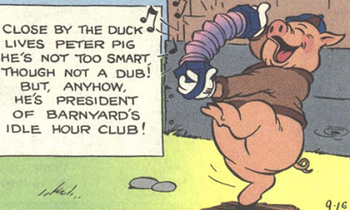
Donald's oldest friend with a similar penchant for self-centeredness.
- Alliterative Name: Peter Pig.
- The Bus Came Back: Peter starred in several comics in the 30s, mostly Italian ones, then disappeared except for two incidental appearances in the 40s and 50s. Starting "Donald Duck Meets Peter Pig" in 1994, he's returned to being a semi-regular.
- Happily Married: Implied in "Donald Duck Meets Peter Pig", although he and his partner could as easily have the same "eternally dating" setup as Donald and Daisy.
- Idle Rich: According to "Donald Duck Meets Peter Pig", Peter's rich nowadays from having invested in computers and doesn't have to work anymore.
- Laborious Laziness: Mostly through Playing Sick and working the pity of theWise Little Hen. Peter's and Donald's original characterization, which both characters have moved away from but which they still fondly look back on when together.
- Old Friend: A significant portion of Peter's modern appearances emphasize that he and Donald go way back, each operating from the premise that the two haven't seen each other in decades.
- Related in the Adaptation: Italian stories sometimes depict him as the nephew of the major of Duckburgh.
Clara Cluck
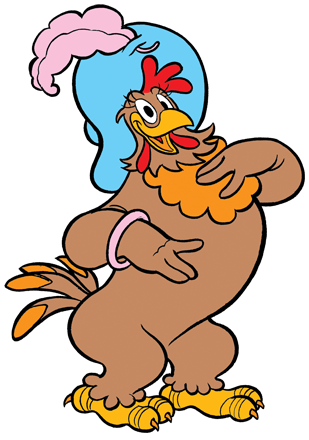
A character who made the jump from the silver screen in the 30s to the comics in the 40s. Generally associated with the Duck comics, but not a stranger to the Mouse comics.
- Accessory-Wearing Cartoon Animal: Clara wears only a hat, qualifying as covered-up on account of her thick feather coat. She's one of the few Duck & Mouse characters to be this naked. The exception are the Dutch comics since 2009, which more often than not give her a full outfit.
- Alliterative Name: Clara Cluck.
- Amazon Brigade: One of the members of Daisy's Adventure Club in the 90s, along with Daisy Duck, Minnie Mouse, Gloria, and Clarabelle Cow.
- Beta Couple: Clara and Panchito could've been this starting "Panchito Meets Clara Cluck" in 1943, but it didn't stick. Played with for deconstruction purposes in "The Double Date" in 1959, where Clara dated Rockhead Rooster.
- Break the Haughty: In effect in a nameless 1943 comic. The year is important because the story is to be understood in context of the war years and some Values Dissonance is in effect for a modern audience. Clara and her colleagues are done doing nothing but laying eggs all day (ie, provide food for the soldiers) and decide to make it big in the city (ie, put their own wishes before the good of the country). Jiminy Cricket follows them with the intent to cajole them back, but realizes soon only Clara has the authority to do so, so he follows her specifically. Clara enters a talent show hosted by a shifty fox fellow, but her victory is an honest one - even Jiminy admits she has talent. The fox invites Clara to his home with the intent to eat her and only Jiminy's intervention saves her life. This is Clara's wakeup call to return to the safety of her duties.
- The Cameo: Most of her appearances in the comics seem to be this. If an artist needs a familiar character to fill out crowd scenes, that character will often be Clara.
- The Confidant: To Daisy Duck, mostly relating to her romance problems.
- Expy: She's generally thought to have been inspired by the Wise Little Hen from the short The Wise Little Hen that debuted two months prior.
- The Prima Donna: As per her debut short in which she's an opera singer furstrated in her performance by the legion of orphans in the audience. Rarely referenced in the comics, however. Ones that do are "King Arthur and the Dragon" and "Goofy's Demonstration Was a Flop".
Old Yellow Beak

A parrot who teamed up with Donald and his nephews to look for the treasure of Henry Morgan.
- Furry Confusion: Overlaps with Polly Wants a Microphone. By all means, he's an animal-type parrot, which is especially obvious in the first few pages of his debut comic until he can tell his story. The rest of the comic treats him as a person.
- Human Notepad: To avoid the route to the treasure being stolen, he had the middle part of the map cut out and tattooed on his chest so both he and the map were needed for the full directions.
- Pirate Parrot: He does not appear to technically be a pirate, but he goes for the look and then there's the whole searching for pirate treasure part.
- Recycled Script: The Donald Duck Finds Pirate Gold plot was recycled in Woody, Knockethead and Splinter Search For Pirate Treasure
 (1963), illustrated by John Carey, in the story, Woody Woodpecker and his nephews replace the Disney characters, however, the Yellow Beak parrot also appears, becoming an unintended Intercontinuity Crossover.
(1963), illustrated by John Carey, in the story, Woody Woodpecker and his nephews replace the Disney characters, however, the Yellow Beak parrot also appears, becoming an unintended Intercontinuity Crossover. - Reused Character Design: In a story
 illustrated by Tony Strobl and published in 1949, Yellow Beak meets the Seven Dwarfs, in this story he looks like José Carioca.
illustrated by Tony Strobl and published in 1949, Yellow Beak meets the Seven Dwarfs, in this story he looks like José Carioca. - Seadog Peg Leg: His left leg is gone and has been replaced with one of these.
- Trademark Favorite Food: He really likes slumgullion, the spicier the better.note
José Carioca

- Breakout Character: In his native Brazil, which isn't too surprising. Much like Fethry or Dickie, he's starred in a lot of Brazil-produced comics and stories, where he got his own supporting cast and his own adventures.
- Captain Oblivious: Part of his Cloud Cuckoo Lander personality. José's fun-loving and affectionate, and cannot fathom why anyone would not be so. A running gag had him one time travel through various parts of America - dangerous parts with wild animals, where he glomped everyone and gave them cigars. Never once did he notice how close he was to being eaten alive.
- Casanova Wannabe: Depending on the Writer to a pretty heavy degree. Don Rosa certainly portrays him as such, and there are a number of Dutch stories centering around him trying and failing to impress various girls. Even in the Brazilian comic, where he has his own fixed girlfriend (Maria Vaz or Rosinha, created while still on newspaper strips), he does quite a fair bit of skirt-chasing (although it never ends well for him). Recently, in the Dutch stories, he got a girlfriend called Parquita, who is similar to his girlfriend in the strips and Brazilian stories.
- Chaste Toons: José have two nephews, Zico and Zeca.
- Cigar Chomper: In early years, he was usually seen with a cigar in his mouth. Not so much in later years, though.
- Cloud Cuckoo Lander: Wanders a lot with his mind, and daydreams mid-conversations.
- The Con: In the first comic strips in the 1940s to the Brazilian and Dutch stories, José applied several scams.
- Dancing with Myself: While he definitely enjoys having a dance partner, Joe doesn't particularly need an audience to dance to any tune he hears.
- Home Sweet Home: His native Brazil. Even though he enjoys the company of his friends, he always has to go back because of his quick-to-hit homesickness.
- In-Series Nickname: He's called Zé in his Brazilian comics and by Brazil as a whole, with his full name rarely being used.
- Mr. Vice Guy: In his comics in Brazil, he's essentially an exaggeration of the "Brazilian Way" (a.k.a. "Get the advantage over everything"): a lazy slob who avoids having to work at all costs, dodges his debts like oncoming traffic (seriously, there's a whole organization of bill collectors devoted to making sure José pays his debts) and is always on the lookout for the next harebrained get-rich-quick scheme. In spite of all this, he manages to be a Jerk with a Heart of Gold by supporting his friends and girlfriend when they need and never resorting to criminal ends to get his way.
- Nice Guy: Usually in non-Brazilian media, where he is an affectionate person who wants other people to have fun (especially Donald). In Brazilian comics, he tends to be more flawed and can give the ducks a run for their money on how lazy and petty he can be.
- The Nicknamer: Loves to call his friends by endearing names, like Pato Donaal (Donald Duck), Panchie (Panchito Pistoles), and even Mickey Moose (Mickey Mouse), though the last is unintentional.
- Puppy-Dog Eyes: More like Bambi Eyes. Between the three caballeros, José has the largest eyes and most visible irises.
- Remix Comic: During the '60s, when Disney's Brazilian comics team was small and needed quick and cheap filler, stories of Donald and Mickey were redrawn and re-lettered to become José stories. His nephews, Zico and Zeca, were created to fill the role of Mickey's nephews Morty and Ferdie.
- Super Zeroes: In the Brazilian comics, he too has his superheroic alter-ego, the Green Bat which, much like Fethry's Red Bat identity, only succeeds through dumb luck. On top of that, everyone can see through his secret identity even if he tries to keep it a secret. Not even trying to go Darker and Edgier (by way of aping Batman directly) in The '90s changed that.
- True Companions: With Donald Duck and Panchito.
- Uncanny Family Resemblance: In the Brazilian comics, he has a lot of cousins who live in other states of Brazil and embody the traits from those parts. They all look like him except for a few traits, such as the Minas Gerais cousin having a mustache; in fact, the one who bears the least resemblance with the others is his cousin from São Paulo (who, conversely, is a workaholic, an old stereotype associated with the city).
- Why Did It Have to Be Snakes?: Mentioning work near him will give him quite a shock. Sometimes it's also a Berserk Button.
Panchito Pistoles

- Affectionate Nickname: Panchie, by José Carioca.
- Friend to All Children: Implied to be fond of little ones in The Three Caballeros.
- Funny Animal Anatomy: He's a rooster with no wattle. This was probably done to make him look younger.
- Guns Akimbo: Less seen in modern times, but originally he was very eager to shoot them around. Even the name "Pistoles" is a corruption of the Spanish word "Pistolas" (Guns).
- Incredibly Long Note: Nothing and no one can stop him from finishing a song, and boy, does he have a long breath.
- Life of the Party: Panchito is loud, high-energy and very much an adrenaline junkie who makes bull-fighting look effortless. The Extrovert to José and Donald's quieter Introvert.
- Overly Long Name: His full name is Panchito Romero Miguel Junipero Francisco Quintero González III. To make life easy for everyone else, he goes by the shortened nickname, Panchito Pistoles.
- Sapient Steed: Panchito's horse, Senor Martinez. He's non-anthropomorphic, but smart enough to be his own person.
- True Companions: With Donald Duck and José Carioca.
Briskin and Fifi
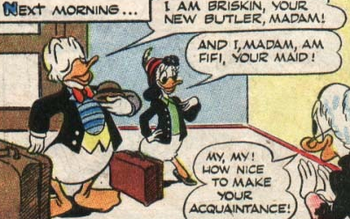
A butler and maid duo who worked at Grandma's farm for half a year after she won a contest by accident.
- French Maid: For starters, there's Fifi's name, but she also wears the outfit and speaks with light bits of Funetik Aksent and Poirot Speak.
- Heroic Seductress: Fifi pulls up some sweet-voiced eyelash batting to get Gus to clean up the house. From the way it happens, this is an act Fifi's put up before and which Briskin is familiar with if not counts on whenever they need another servant to get moving.
- The Jeeves: Briskin quickly takes running the household out of Grandma's house (much to her annoyance). He even hires a cook — it is unclear if the cook's hiring falls under the prize too, but Grandma fired the lot of them a few hours later anyway.
- Savvy Guy, Energetic Girl: Within the confines of proper servitude, Briskin and Fifi do fit the trope. Overlaps with Huge Guy, Tiny Girl.
- The Stoic: Complete with Eyes Always Shut. Even when Grandma out of pity lets him and Fifi stay and assigns them the animals to take care for, he keeps up the proper butler act while feeding the pigs!
- Unwanted Assistance: Grandma won the radio contest by complete happenstance and tried fruitlessly to back out of the prize. At first, she tried to make the best of it, thinking a bit of help around the farm would be welcome, but things went south already when Briskin and Fifi arrived. Grandma had baked a cake to welcome them, imagining they'd have the same relationship with her as Gus, but they had to refuse because it would be improper for them to sit in her presence. This, in turn, made Grandma nervous she'd come across as ignorant of high society customs, especially because the two kept mentioning their former employer, Lady Uppington, in ways that weren't meant to be condescending but still were. Trying not to be outdone, Grandma went along with it until she couldn't take it anymore. The only reason she came back on firing them is that they told her that they'd never find work again if they'd return early, after which she put them in charge of caring for the animals.
Dora

One of Daisy's close friends.
- The Bus Came Back: She had her run in the 50s and 60s, but was dropped thereafter. Starting 2013 with "Who is Daisy Duck?", she's become a semi-regular.
- Depending on the Artist: Dora's been depicted with brown hair, blonde hair, and white hair; a standard duck beak, a small duck beak, and a pointy beak; standard duck size and slightly taller; dressed in blue, green, and yellow. Her 2010s design seems to have settled on brown hair, a standard beak, a standard size, and blue clothes. In any case, she's always recognizable by her haircut.
- Gossipy Hens: Usual, but particularly notable in a 1958 Daisy Duck's Diary comic when she and two others stalk Daisy and interpret everything she does in the worst possible way. Then they spread their made-up story.
- No Name Given: She's only known as Dora, which is only mentioned in "Fibber Flipper". No last name is given, though convention of Alliterative Name and Species Surname leads to one guess...
- Satellite Character: To Daisy Duck, to whom she fills out a quartet with well-established characters Clara Cluck and Clarabelle Cow.
Cy Sickle
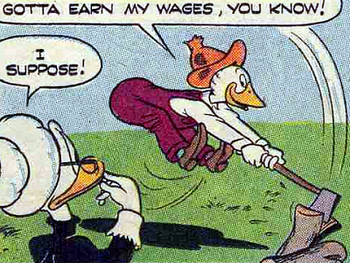
A farmhand Grandma Duck hired the one time she fired Gus for being too lazy. She changed her mind when Cy was too active for her own tastes.
- Hyper-Competent Sidekick: If Grandma is the glass, Cy is the Mirror Self of Gus.
- Only in It for the Money: He's thoroughly focussed on earning his paycheck. When Grandma fires him with payment for two weeks after only having him around for a few hours, he's got this to say:Cy: This has happened before! I usually work myself out of a job the first day — but I don't mind when I get paid for two weeks!"
- Super-Speed: Not acknowledged, but he's crazy fast. Like, he arrived at the farm by running instead of driving and he ran a plow by hand because the horse was too slow for his liking.
- Supreme Chef: He's won prizes on his baking.
- Unwanted Assistance: Cy became this when he proved to be competent at every single job at the farm and could do it way faster than should be humanly possible. Grandma went from job to job in desperation for something to do, but he always was right around the corner to take over (and remind her she, as an elderly lady, should take it easy). Even cooking he wouldn't let her do!
Gloria Goose

One of Daisy's close friends.
- Hypocrite: Gets angry at Daisy for making fun of her hat with Clara, then proceeds to make fun of Clara's hat with Daisy.
- Informed Species: She looks like a duck rather than a goose.
- Motor Mouth: Implied to be this over the "regular" Gossipy Hens.
Rockhead Rooster
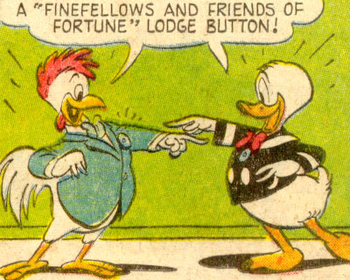
A resident of Chickentown and a good friend of Donald on account that they agree on everything. He's also the former pen pal of Clara Cluck.
- Abhorrent Admirer: A male example. Clara ended their pen pal relation when she realized how similar to Donald he was. He still keeps writing her regardless.
- Alliterative Name: Rockhead Rooster.
- Blind Mistake: Rockhead wears glasses, but didn't take them with him on the double date. He and Donald are asked to be judges for a dance contest and for the first time they disagree on something: which couple deserves to win, Number 3 or Number 8. They swear to never talk to each other again, but by the end of the evening Rockhead discovers his limited sight made him mistake the "3" for an "8" and thus he and Donald did have the same judgement. They're promptly besties again.
- Commonality Connection: He and Donald have almost the exact same personality and interest, and they become such besties that they ignore their dates to chat with each other. It gets so bad that, when two guys try to talk to them, both Donald and Rockhead immediately offer their girlfriends to dance with the strangers so they can have more time to themselves.
- Identical Stranger: Not so much in looks, but personality-wise, Rockhead and Donald are the very same.
- Put on a Bus: Daisy and Clara decided to never double date again with Rockhead and Donald because the men completely ignore them when together. What with Rockhead living a train ride away, he and Donald haven't met since.
Gussie Fussy
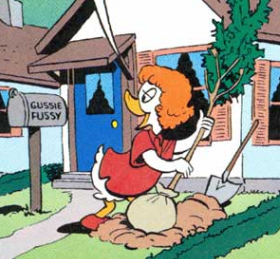
Donald's and Daisy's in-between neighbor. She's on good terms with both of them.
- Alternate Continuity: Donald and Daisy normally don't live two houses apart and don't have Gussie as neighbor.
- Irritation Is the Sincerest Form of Flattery: What Gussie and all the other neighbors are to Daisy.
Jubal Pomp

A not-so-skilled businessman who really wishes he could be successful like Scrooge, but doesn't really have what it takes, despite being just as eager (and usually just as honest). A friend (and nothing more) and protegé of Brigitta MacBridge. When working with her he can usually accomplish more than on his own. Like Brigitta, created by Romano Scarpa and used mainly in Italian comics, where he is named Filo Sganga.
- Catchphrase: "Business is business!" - And that's pretty much all he knows about business.
- Characterization Marches On: In his first appearance he was the villain of the story. In later appearances he became more sympathetic, but was still a bit of a cheat and a con man. Later still, he became an out-and-out good guy with only the occasional lapse into dishonesty.
- Clean Dub Name: Sort of. His first name in English was Jubal ''Cock''...
- Cloudcuckoolander: Has traces of this, which is one of the main reasons why he's such a poor businessman.
- Honest John's Dealership: His business practices are sometimes close.
- Inconsistent Dub: The Norwegian translators have real difficulty agreeing on a name for this character.
- Large Ham: Possibly the hammiest recurring character in all Disney comics.
- Older Than They Look: The story of Brigitta's first meeting with Scrooge shows he was already trying (and failing) to strike rich in 1897.
- Zany Scheme: Most of his attempts at business.
Juanella Van Damm
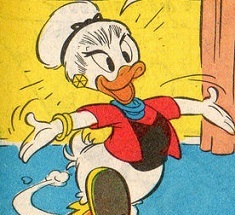
A rich spoiled bad-tempered lady duck who was a love interest to Donald until she turns hateful towards him.
- Depending on the Artist: The color artists originally couldn't decide whether she had white or red hair.
- Everyone Went to School Together: She used to be Daisy's classmate and Daisy hated her because she cheated by copying on others.
- Mood-Swinger: She alternates between phases of apparent affability to moments of hysterical rage, which is bad especially for her servants.
- Rich Bitch: She is absurdly rich, but has also a really bad temper. Donald discover it when she turns hateful towards him just because they lost a treasure hunt in a gala event.
- Uptown Girl: To Donald until her real personality is revealed.
Katie Mallard

Known as Hashknife Kate is her heydays. She's one of the few oldtimers remaining in Goldopolis, Nevada.
- Cool Old Lady: She used to run the Gold Cup Café in Goldopolis and never abandoned the city even when its glory faded and it became a borderline Ghost Town with only her, her granddaughter, and oldtimers Cyanide Charlie and Hardrock Joe left to call the area inhabited.Katie: "Pushin' trains is no lady's job, but I'm too mad to be a lady!"
- Demoted to Extra: For unknown reasons, Katie was almost completely ignored by Don Rosa for The Life and Times of Scrooge McDuck. From Scrooge's elated reaction to hearing Katie's still around in "Mystery of the Ghost Town Railroad", it's clear she was someone close to him for a time in his youth. For all the effort Don Rosa put into expanding on the relations Carl Barks often only implied, like those with Goldie and Scottie, the fact Katie only got one panel in "The Richest Duck In The World" is jarring. And it's not even a panel that shows anything about her friendship with Scrooge! There's a page worth of script material that gives her a little more spotlight time, but it's gag stuff that does not concern itself with explaining Scrooge's fondness of Katie.
- Never Mess with Granny: She was tough in her youth and age hasn't changed that. If trouble's brewing, she's got a gun and some reliable equally aged friends ready to back her up.
- Old Friend: A good one of Scrooge. It's hard not to smile at the sheer happiness Scrooge exudes when he gets to meet her again.
- Red Baron: Hashknife Kate, although no story explains why that is her nickname.
Ducky Bird

The granddaughter of Katie Mallard and one of the few residents of Goldopolis, Nevada.
- Action Girl: A mightily efficient one with a good head on her shoulders. She even makes the final save!
- Cowboy: Type Cowgirl, obviously, but without any of the romantic stuff. She's also quite a bit braver than the rest of the team when they face ghosts in the Goldopolis Hotel. Well, at least until bullets prove ineffective.
- Distaff Counterpart: Not overtly so, but it's obvious she's supposed to be to Katie what Donald (and the triplets) are to Scrooge.
- Young Gun: Has elements of this due to being the youngster among her grandmother, Cyanide Charlie, and Hardrock Joe.
Matilda

Gyro's first and most recurring girlfriend. She owns a restaurant.
- Cloudcuckoolander's Minder: To Gyro. Pointing out all the things going wrong because he's not paying attention or underestimating the situation is a day job.
- Supreme Chef: It's because she can cook well that she started her own restaurant, although she mainly occupies herself with host duties.
- Woman Scorned: Gyro periodically neglects her in favor of his work or tries to appease her by sending her inventions instead of spending time with her himself. Matilda does not take kindly to this.
Belle Duck

The owner of the "S.S. Gilded Lily" and a former love interest of Scrooge McDuck.
- Amicable Exes: Possibly with Scrooge. It's generally implied more than stated that they used to have some sort of romantic connection, though how deep it went is never elaborated upon. However things used to be, though; there's no romance between them in the present day, but they still get on all right... Scrooge never deliberately seeks out Belle's company (usually because whenever the "S.S. Gilded Lily" is in need of repairs, she has a nasty habit of asking him for the funds), but he doesn't go out of his way to avoid her either.
- Big Fun: Always the life of the party and always upbeat.
- Guile Hero: In some stories. She's a lot craftier than she appears and will occasionally use her natural Big Fun nature to appear more gullible than she really is.
- Life of the Party: She loves a good party and will find a way to throw one even without a penny to her name.
- Riches to Rags: Belle used to be immensely wealthy, but these days owns little more than the "S.S. Gilded Lily", an old steamboat. She's lost her money by spending it.
- The Rival: She and Captain Annie compete in "The Great Boat Race".
- Southern Belle: According to Scrooge, she was the loveliest and richest girl on the Mississippi. Even when old and poor, she hasn't lost her carpe diem attitude.
- Uptown Girl: Implied. Scrooge wasn't rich when he hung around the Mississippi and still Belle knew him in those days within a romantic context.
Genialina Edy Son
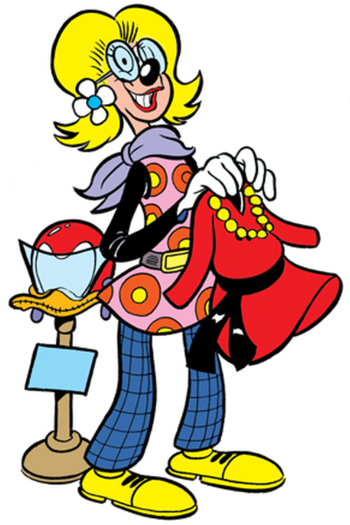
Some time ago, Genialina was Gyro Gearloose's pupil, and just like her teacher, who provides weapons and gadgets to the Paperinik (Duck Avenger), she helps Paperinika (Super Daisy) in her missions.
- Distaff Counterpart: To Gyro that was her teacher. Howewer she dedicates to mechanics just as a hobby in her free time.
- The Fashionista: Genialina doesn't have a fixed clothing style, but instead it varies from story to story. She currently owns a fashion boutique.
- Gadgeteer Genius: She provides weapons and gadgets to Paperinika (Super Daisy)
- Shout-Out: Her surname to Edison.
- Straw Feminist: Implied. She is president of Duckburg's feminists club.
Tilly Billbrook

The owner of Duckburg's finest floral emporium and a former love interest of Scrooge McDuck.
- Gave Up Too Soon: If only Scrooge had read Tilly's time of arrival correctly as 5:03 instead of incorrectly as 3:05. If only he'd checked or waited. And if only Tilly had tried to look for him when he didn't show up, trusting in her own conviction he'd want to see her again. Maybe they'd have had a life together.
- Innocent Flower Girl: She picked up selling flowers when she came to Duckburg with not a penny to her name and no Scrooge waiting for her. Ironically, the bouquet she picked up and sold as the start of her career was the very bouquet Scrooge had thrown away thinking Tilly wasn't coming after all.
- Love Triangle: Scrooge and Alexander Noyes competed for her attention. Through trickery, Alexander "won" and chased his rival out of town in humiliation. However, Tilly soon realized what a worm Alexander was and went after Scrooge.
- Old Friend: Although they parted as lovers, when they meet again at old age it is readily understood the book on their romance has closed and any bond left is platonic.
- Self-Made Man: Her first career as saloon girl in British Columbia was her own work and her second career in Duckburg started with only a bouquet, not unlike how Scrooge started with only a shoe polish set.
Linda Paper

A woman as unlucky as Gladstone is lucky. He likes her, but she can't stand lucky people
- Born Unlucky: Heavily implied to be the case.
- Damsel in Distress: More or less her default mode. Gladstone meets her when it rains and her umbrella malfunctions, offering his own.
- Distaff Counterpart: Of Donald.
Princess Oona
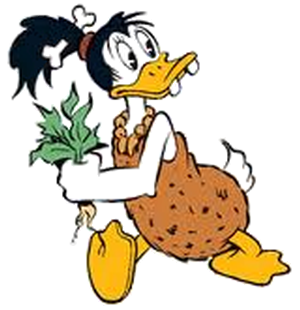
A cavewoman Donald took with him from a trip to the past. She causes a lot of unintentional trouble for him until she returns home (from where she comes back with her own niblings).
- Abhorrent Admirer: Principally to Donald Duck, but also to Gladstone Gander.
- Contemporary Caveman: She ended up in present-day Duckburg because of time travel.
- Distaff Counterpart: To Bubba of DuckTales fame. She's a much more successful character than he is, taking center stage in over thirty stories.
- Gratuitous Princess: Oona's status as princess is irrelevant past her intro-comic and even there it meant little.
- You No Take Candle: Being a caveduck, Oona talks like this.
Garvey Gull
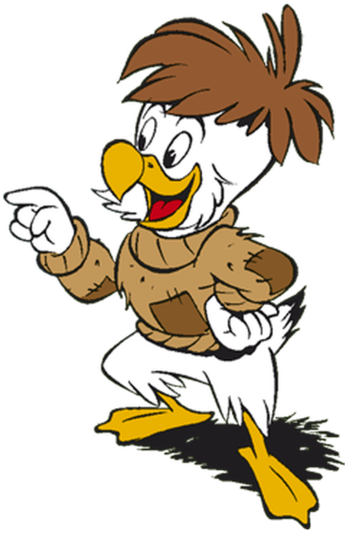
A homeless boy who enjoys the free life he leads. A friend of Huey, Dewey, and Louie to the periodic dismay of Donald who does not consider him the best influence.
- Alliterative Name: Garvey Gull.
- Arch-Enemy: Mr. Phelps, a train inspector who wants the boy out of his train station and trains, is Garvey's designated opponent. Him being an adult and Garvey a child, it's not a hostile relation and often puts the focus on "friendly" in Friendly Enemy. In fact, in "How The Other Half Live", it was Phelps' request for Garvey to return because he considered the train station too quiet that helped the boy make up his mind.
- Artistic License – Law: Downplayed. In one story, Huey, Dewey and Louie finds his birth certificate and moves it from the G-section in the city archives to D for Duck. While they treat this as him being part of the family, it's clearly not true adoption, as he's back to his street rat ways in the next story.
- The Artful Dodger: A very successful one, but not at all criminal. He got taken in twice, once sincerely in "How The Other Half Live" and another time by means of Swapped Roles in "Which Is Which?". Neither times did he want to stay.
- City Mouse: To the triplets' Country Mouse status. In "Junior Chuckwoods", Garvey finds that his city Street Smart doesn't do him much good in the woods, which means it's up to Huey, Dewey, and Louie to get them back home.
- Identical Stranger: Type Prince and Pauper in "Which Is Which?", when Garvey temporarily switches places with a rich boy that looks just like him except with glasses.
Luna NJ-1980
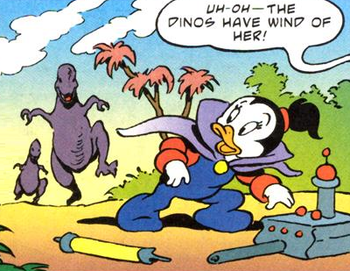
An young alien who met Donald when he caused elements of different times to be brought into one world.
- Ambiguous Ending: Overlaps with Bittersweet Ending. The world Donald and Luna find themselves stuck in was created by one of Gyro's inventions. He calculates that Donald is the central element of the new world and if he gets him back safely, all other elements will return to their right places too. Donald barely has time to say goodbye to Luna when Gyro pulls him out and neither he nor the audience gets confirmation whether she's safe (her spaceship had crashed earlier). The implication, however, is that she's fine and does not need to be worried about.
- The Cutie: Despite everything that's happening, Luna does not lose her belief that everything will turn out right, in contrast to the more stressed-out Donald. She also doesn't think to hold it against him he caused the mess in the first place, instead admiring his resilience.
- Damsel in Distress: She's under attack from dinosaurs when Donald meets her and for the rest of the story is dependent on Donald keeping her safe. Semi-justified in that she's implied to be quite a bit younger than he is.
- Tragic Keepsake: She's got a small metal card as a memento from home with her. She gives it to Donald to remember her by just before he disappears from sight.
Brenda
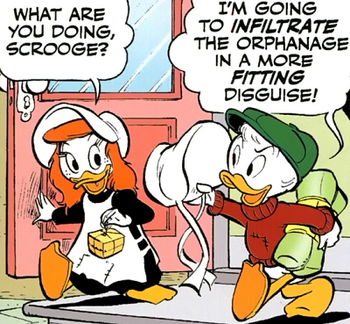
An orphan girl Scrooge befriended when he was twelve. He still has a locket with her picture in it.
- Damsel in Distress: In the final pages when MacMiser takes her hostage.
- Fiery Redhead: Of the spirited, vivacious variety. Scrooge's involvement with the scam at the orphanage starts when Brenda smuggles him inside by giving him a false beard and making up a story for him to be allowed to enter.
- Heartwarming Orphan: Brenda is introduced to the audience while crying over her and her fellow orphans' plight. They're forced to make long hours sewing kilts to financially sustain the Strathbungo House Girls' Orphanage, supposedly being only able to sell the kilts for a minor profit. To save on money, the food's limited and nothing is spent on heating. All the same, Brenda is lively and kind on Scrooge and Mr. Jolly, the owner, who pretends to be in a tight spot with Mr. MacMiser, the greedy landlord. When a big cash donation that would've allowed the orphans to celebrate the winter holidays goes to MacMiser, she's one of the people to go after him to get it back.
- Morality Pet: She prevents Scrooge from attacking MacMiser on grounds that the right course of action is not personal revenge but to get the police involved.
- Orphanage of Fear: What the Strathbungo House Girls' Orphanage was under MacMiser's control. It turned into an Orphanage of Love when Lady Meddleson took over.
Residents of Plain Awful
First appearance: Lost In the Andes, 1949A small tribe of humanoids with notably square features, who inhabit an extremely isolated valley somewhere in the Andes, which also happens to be home to a strange breed of chickens that lay square eggs.
- Cannibal Tribe: Played for Laughs, when the ducks first stumble across the valley, the Awfulers gleefully exclaim they haven't had Americans for dinner since 1846. Turns out they actually mean they haven't had any as GUESTS, not as a meal.
- Cargo Cult: Because of their total lack of contact with the outside world, the Awfulers latch on to the culture and personality of the very rare visitors they get. When Donald and the nephews first met them, they had embraced the persona of Professor Rhutt Betlah, an explorer from the American South, who had visited the valley in the 19th century. When Donald returns with Scrooge in the sequel story Return To Plain Awful, they discover that the inhabitants have adapted Donald's mannerisms since then, and by the time they leave again, they've begun mimicking Scrooge.
- Comic-Book Time: Since Don Rosa uses the same timeline as Barks did, Return To Plain Awful acts as if only a few months have passed since the ducks last visit, short enough time that the square chickens they brought back are still alive and well, while in real life, 40 years had passed between the stories.
- Disproportionate Retribution: Plain Awful has one major law - you are not, under any circumstances, allowed to create or possess anything round, under penalty of death (and later, hard labor). They don't seem to mind that their visitors have round bodies and features though, presumably because people can't control how their bodies are shaped.
- "Shaggy Dog" Story: At the end of the first adventure, Donald and the nephews leave Plain Awful with a load of eggs and two of the square chickens to bring back to the outside world. Finding their way back through the mists takes so long that they're forced to eat all the eggs just to stay alive, but atleast they have the chickens... which they only notice are actually roosters once they get back to Duckburg, and thus can't produce any more square eggs.
- Small, Secluded World: Plain Awful is incredibly difficult to reach, due to it's isolated location and the heavy mists surrounding the valley, and just as difficult to leave again. The only known explorers to have found the valley are Professor Rhutt Betlah (who died of exhaustion trying to find his way out, so the records of his discovery never reached the outside world), Donald Duck, the nephews, Scrooge, and Flintheart Glomgold.
- Wacky Wayside Tribe: Doesn't get much more wayside than this, Plain Awful has literally zero impact on the rest of the series aside from the square eggs, and in neither story have the main characters managed to successfully introduce the eggs to the world.
- Worthless Yellow Rocks: In the sequel, after adapting Scrooge's personality, they ask for money to store in their newly constructed money bin in return for Scrooge's freedom and exclusive rights to trade for their square eggs. Scrooge pays them a billion dollars in cash, but much to his horror, they end up cutting the dollar bills up in perfect squares to fit their culture, since they just wanted the money for ornamental reasons.
Bum Bum Ghigno

A friend of Donald Duck and Gyro Gearloose in some Italian stories. Mostly he acts as a trio with the former two. He´s a neighbor of Gyro and a professional white washer.
- Characterization Marches On: In his first appearance, he opposed both Donald and Gyro. Later, the three of them become close friends.
- Hidden Depths: He's usually depicted as stubbornly fool, but can be rather cunning when needed and used to be a surprisingly effective superhero armed only with white washing tools. On a good day he's actually a very competent white washer - but he's also still suffering from the depressing events that pushed him to leave his previous lucrative job at a construction company and abandon his superhero persona (see below), so he rarely has good days.
- Stepford Smiler: Heavily implied to be deeply depressed after a colleague at his old company he looked up to turned out to be a crook blackmailing their bad boss for using substandard material (the reason the boss was so bad being that he was constantly nervous for the blackmail and cutting even more corners to stay afloat and pay him). But you wouldn't know, given his usual cheerful bumbling.
- Successful Sibling Syndrome: That was his motivation in his original appearance. He has a brother who is more talented and successful than him, feels like an insecure loser and stole Gyro's machine to steal the talents of others. However, his brother turns up and reveals that *he* actually looks up to *Bum Bum*, as he is a generous man who helped him achieve success.
The Peeweegah
First appearance: Land Of The Pygmy Indians (1957)A tribe of tiny but fierce Native Americans that inhabit the wilderness of the Northern Woods.- Despair Event Horizon: The tribes chief nearly hits in in the sequel story, War Of the Wendigo; The Peeweegah's most sacred vow is that they shall never destroy the home of another, but due to the events of the story, Scrooge's paper mill has to be destroyed (the foreman had gone rogue and was causing an ecological disaster out of sheer spite), forcing the chiefs hand, even if it meant that the tribe would fall apart. Scrooge saves him by destroying the mill himself.
- Nature Hero: The Peeweegah serves as protectors of nature, and can even speak with animals.
- Pyrrhic Victory: The ending to War Of The Wendigo; the paper mill might be gone, preventing any further damage, but the area is a wasteland, and will remain so for decades to come.
- Speaks Fluent Animal: The Peeweegah can speak with the animals that live in the wilderness with them, and the animals seem to obey them to some extent, though it's implied to be of their own free will rather than control.
- What the Hell, Hero?: They call out Scrooge for seemingly having broken the promise he made to them in the first story due to his paper mill causing acid rain and pollution on their lands despite being miles away. It's part of the story's Green Aesop that nature is connected, and you can't wreck one part of it while preserving another.
Theodore Roosevelt
First appearance: The Buckaroo Of The Badlands (1992)The 26th President of the United States, who struck up a surprising friendship with Scrooge.- Self-Made Man: Despite being born wealthy, Roosevelt wants to become successfull on his own merits, and expresses admiration for Scrooge, who started out with nothing.
- Victory Is Boring: Downplayed; he takes his role as President seriously, but is all too eager to take himself and his Rough Riders out of retirement during the events of The Invader Of Fort Duckburg.
- What the Hell, Hero?: In The Sharpie Of the Calebra Cut, he calls Scrooge out for essentially holding the construction of the Suez Canal hostage with his claim on Gold Hill.
- Young Future Famous People: First met Scrooge during his days as a rancher in Dakota, long before his presidency.
Hard Haid Moe

- The Friend Nobody Likes: While he's a constant character in the Duck universe, most of the other characters don't seem to really like him thanks to being a grumpy old man who loves shooting at them. Only exception might be Fethry Duck.
- Friend to All Children: While he's always grumpy, one Italian story reveals he really has a soft-spot for children and acts far nicer around them.
- Grumpy Old Man: His grumpyness is his main personality feature. He often greets visiting people of all kind with his shotgun. Judging by his hair, he's also a lot older.
- Half-Witted Hillbilly: A kid-friendly version: He's often shown to be really uneducated and hates "town folks" and their modern shenanigans.
- Hidden Depths: Despite being grumpy and egoistic, he actually loves children and enjoys their company.
- Odd Friendship: With Fethry Duck. Fethry's a fun loving, free-spirited guy opposed to Hard Haid Moe's grumpy hillybilly personality, but Fethry considers Moe a friend and despite being annoyed by him, Moe sometimes seems to enjoy Fethry's company.
Houn' Dawg
First appearance: It's Music? (1964)Hard Haid Moe's pet dog.- Apathetic Pet: He's very lazy and often just comments the action in Thought Bubble Speech.
- A Dog Named "Dog": He's a hunting dog called "Houn' Dawg".
Jabiru Kapirigi
First appearance: The Dreamtime Duck Of the Never Never (1992)A wandering aborigine wiseman who Scrooge encountered during his days as a prospector in the Australian outback.
- Magical Native American: An aborigine variation, who introduces Scrooge to the value of stories and myth.
- Maybe Magic, Maybe Mundane: Jabiru has no obvious supernatural abilities, but sure seems to have luck on his side. Scrooge comes around just in time to save him from a thief, a sinkhole reveals a cave entrance just when he's making the right incantations, and a thieving magpie happens to have built it's nest right by Jabiru's campsite when Scrooge laments having lost his #1 Dime. Sure enough, the coin is right there...
- Sarcasm-Blind: Presumably due to his poor English, he doesn't really understand sarcasm very well, thinking that Scrooge's name is "Jonflip" after he makes a snark about being John Philip Sousa when Jabiru asks him to play the didgeridoo as part of a ceremony.
- Small Role, Big Impact: Jabiru only appears in a single chapter, and never sees Scrooge again, but their encounter inspired Scrooge to seek his fortune in the Klondike, right ahead of one of the last gold rushes.
- Time Abyss: The last visitor to the Dreamtime cave was Jabiru's grandfather, following a strict schedule that dates the hand marks in cave as far back as 20 000 years!Jabiru: The Dreamtime was not last week, Jonflip.
- Worthless Yellow Rocks: Jabiru doesn't even bat an eye at the magnificent giant opal kept inside the Dreamtime cave, as his role is to record his visit, not stare at glittery relics.
Tralla-La
First appearance: Tralla-La (1954)A utopian society located in an isolated valley somewhere in the Himalayas, almost impossible to reach, where the inhabitants have no concept of money, scarcity, or greed. As revealed in Don Rosa's sequel story, Tralla-La is in fact the legendary land of Xanadu itself, where Kublai Khan once held court.- Animated Adaptation: The original "Tralla-La" story recieved a relatively faithful adaptation in Ducktales 1987, with the biggest change being the ending, due to the presence of Gizmoquack.
- Dark and Troubled Past: The reign of Kublai Khan, who enslaved the native inhabitants and turned the valley into his personal kingdom.
- Easily Forgiven: When the Ducks return to Tralla-La, the inhabitants are happy to see them again, having long since forgiven the chaos Scrooge and his bottle caps caused on their first visit. This lasts all of five minutes, until Scrooge reveals that he's brought the Crown of Kublai Khan with him - the same conqueror who brutalized and oppressed Tralla-La centuries ago, sending the people into a panic.Donald: First Plain Awful and now this? Honestly, Uncle Scrooge, we can't take you anywhere!
- Not So Above It All: While the people of Tralla-La are generous and welcoming almost to a fault, they're not actually immune to greed, there's just nothing rare enough in their society to covet that badly. Something as simple as a bottlecap upsets the whole system, as shown in the original Barks story, since Tralla-La has no native metal.
- Small, Secluded World: Like Plain Awful, Tralla-La is extremely isolated, and can only be reached by a dangerous and difficult treck through the Himalayan mountains, or, in modern day, using parachutes while flying overhead. There's actually a third path, a passage following an underground river, which was constructed by Kublai Khan during his reign, but it was abandoned and eventually frozen over after he disappeared, with the Ducks only finding it by random chance.
- Worthless Yellow Rocks: Tralla-La has no monetary system at all, with resources and labor shared willingly and generously. After Khan vanished, the people of Tralla-La disposed of his massive treasure by throwing it into the whirlpool in the middle of the valley, seeing it as a symbol of his tyranny.
Newton Gearloose

- Chaste Toons: His parents are never shown or mentioned. He only interacts with Gyro, his uncle, but doesn't live with him.
- Child Prodigy: He's just a child but as brilliant as his uncle.
- Gadgeteer Genius: Just like his uncle Gyro.
- It Runs in the Family: Being brilliant and building incredible machines seems to be a family trade of the Gearlooses. Newton is no exception.
- Named After Somebody Famous: His first name is Newton - named after the famous scientist Isaac Newton.
- Accidental Truth: In The Son of the Sun, he claims that the Incas threw their gold in the bottomless lake of Cuzco to deny it to the Spanish invaders. That's exactly where the gold ends up after the events of the story.
- Catchphrase: "These Americanos are crazy".
- Locked Out of the Loop: He's an outside observer who only sees Scrooge, Donald and the other characters during the start of their adventures, thinking they're off chasing silly legends. He's never around to see that all of it is actually real.
- Native Guide: Serves as one for Flintheart Glomgold in Return to Plain Awful. While he's never been to Plain Awful himself, he knows about the square eggs, and more importantly, knows how to navigate the mists and survive in the mountains.
- No Name Given: While he only interacts briefly with the Duck family, not even Glomgold seems to know his name, despite hiring him.
- Screw This, I'm Outta Here: Decides to head back to civilization after Glomgold ignorantly jumps over a mile-high wall to reach Plain Awful.
- Vague Age: It's unclear just how old he is, but he looks incredibly ancient, and his father was at the very least around in the mid-1800's, when Professor Rhutt Bettlah died during his return journey from Plain Awful.
- Always a Bigger Fish: Much to Earp's frustration, Scrooge's reputation already outshines his by a mile.
- Aren't You Going to Ravish Me?: Non-romantic example - Earp is outraged when some random thug doesn't even know who he is, and tries to push past him and challenge Scrooge. In fact, he's so insulted that he gets into a brawl with said thug and grabs his gun, shooting himself in the foot just so he could say the guy shot him.
- Power Trio: With Bat Masterson and Hanging Judge Roy Bean.
- Small Role, Big Impact: Scrooge got part of the blame for the Bar Brawl Earp started, just because Earp refered to him as his "pal", and the resulting fine cost Scrooge every cent he had, forcing him to do business with Soapy Slick and setting up their rivalry.
- What the Hell, Hero?: During the events of The Prisoner of White Agony Creek, Earp is horrified to the depths Scrooge has seemingly sunk to, as he's seemingly kidnapped a woman and forced her into slavery.
McDuck employees
Clerkly

Scrooge's accountant. His appearance and age tend to vary, but his appearance as in the selected image (minus the missing green eyeshades) is his most common design.
- Depending on the Artist: Even his creator, Carl Barks, didn't stick with one design. He is always a dogface taller than Scrooge, but his variations include: yes or no green eyeshades, yes or no glasses, orange or brown shade of hair or bald, as old as Scrooge and Quackfaster or somewhere in his 30s, long muzzle or short muzzle.
- Intergenerational Friendship: What he has with his colleague Quackfaster and to a lesser extent with Scrooge.
- Undying Loyalty: Like all Scrooge's longterm employees, he refuses to switch employers as long as he can work for Scrooge and doesn't take well to hostile takeovers.
- Woolseyism: In Norwegian, his name is Kontorsen (Office-son).
Quackmore

Scrooge's butler.
- Beware the Nice Ones: He's one of the calmer and nicest characters of the 'verse. He's also the one who takes care of the Money Bin's cannons, and can fire them with extreme precision.
- Characterization Marches On: The Quackmore as he's known today first starred in "Zio Paperone e l'angolare di sicurezza" in 1967. He is preceded by the Quackmore that debuted in "Zio Paperone e la lana vulcanica". Both are creations by Rodolfo Cimino and more than arguably are the same character, but official and semi-official sources like the Italian Topolino website and INDUCKS treat the two as separate.
- Cool House: His room in the Money Bin is full of luxury goods, including a robotic butler. Turns out that one of his duties is to test the newest McDuck luxury products, and once the test ends he's allowed to keep them.
- Friendly Enemy: He and Jeeves get along quite well when they get a moment away from their respective employers.
- Hidden Depths: Extremely cultured, thanks to reading the books from Scrooge's library as he cleans it.
- Hypercompetent Sidekick: His budget for job-related expenses and the food is incredibly small-and yet the place is spotless and the Money Bin inhabitants are well fed and healthy.
- In a few occasions, Scrooge's relatives have convinced him to let Quackmore help them receiving some important person. Quackmore always already knows the best way to receive them as it's always people who have butlers of their own and Quackmore has long asked the butlers the best way to receive them in the off-chance they'll one day be Scrooge's guests (and explained his colleagues the best way to receive his boss, of course).
- Living Legend: The best butler in the world, and deeply admired by his colleagues thanks to his ability at his job (see Hypercompetent Sidekick above).
- Nice Guy: Always nice and understanding, even when not required by his job.
- No Name Given: Quackmore does not have an official first name in English. Before settling on "Quackmore", he was called "Albert" and "Baptist", the former being the name of an older butler character from the 50s and the latter being the English version of his original Italian name, "Battista". Either name could work as a first name, but has so far not been used in combination with "Quackmore".
- Nonindicative Name: Possibly a case of Theme Naming with Duckworth of DuckTales fame. Both butlers are dogfaces, yet have duck-themed names.
- One-Steve Limit: His last name, which is all he's known by, is the same as the first name of Scrooge's brother-in-law and Donald's father, Quackmore Duck.
- Undying Loyalty: Best shown in "Scrooge's Last Adventure". When Glomgold and Rockerduck take over Scrooge's empire he quits in barely restrained fury, and after Scrooge's (faked) disappearance is seen in crowd scenes trying to stop them from destroying the Money Bin until Scrooge comes back to reclaim his money, at which point he resumes his old job.
Wadly
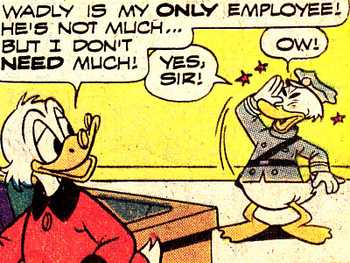
Scrooge's lone or personalized security guard, depending on the story.
- Clothes Make the Superman: More symbolic than power-giving, but after the events of "The Mysterious Black Pearl Ring", Scrooge buys Wadly a Super Goof costume to scare away any bad guys. It also does wonders for his self-image.
- The Klutz: His heart's in the right place, but the rest of him usually not.
- One-Steve Limit: Averted. He shares a name with one of Scrooge's chauffeurs from the 60s.
- You Get What You Pay For: Wadly is not the best guard to be found anywhere where he's not alone. But he's cheap. Scrooge relies on external labor he doesn't have to pay for, like Super Goof's heroism, to take care of whatever Wadly can't.
Scottie McTerrier
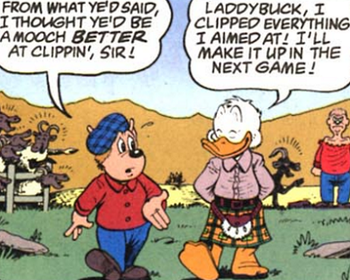
The caretaker of McDuck Castle ever since Scrooge hired him for the job when he was still a young boy. He's passed away from old age in present day and been succeeded by Matilda McDuck.
- Identical Stranger: Scottie has an Evil Doppelgänger in Diamond Dick. The two never met.
- Kid Sidekick: Scottie was this to Scrooge during the Highland Games. He acquired the position on grounds of Because You Were Nice to Me.
- Legacy Character: On the meta side of things. Scottie as he appeared in "The Billionaire Of Dismal Downs" is based on Diamond Dick, who pulled a Dead Person Impersonation of Scottie, as he appeared in "The Old Castle's Secret".
- Old Friend: Overlaps with Undying Loyalty. Scottie has been the caretaker of McDuck Castle from his youth until the day he died of old age. Scrooge has always trusted him and was deeply upset when it seemed Scottie was trying to steal his ancestor's treasure. It was a bittersweet relief that, actually, Scottie had been dead for months already and the thief was a mere lookalike.
Pets
Bolivar/Bernie/Bornworthy

Donald's lazy and stupid St. Bernard, who is generally much more at home sleeping in front of the fireplace than he is going out on adventures and suchlike. Doesn't appear in many stories, but generally makes himself known in a big way when he does appear.
- Big Friendly Dog: He's very big and very good-natured.
- Characterization Marches On: He first appeared in the cartoon The Alpine Climbers where he was a genuine rescue dog who stoically braved the icy alps to rescue Mickey, Donald and Pluto. When he was brought over to comics as Donald's pet, he pretty much lost his stoic heroism and became a lazy, stupid coward who hates the cold and runs inside to huddle by the fireplace the moment a snowflake falls.
- Depending on the Writer: His real name is Bolivar, but due to fear that this might be seen as a slur on Simon Bolivar, writers have named him "Bernie," "Bornworthy," "Bolly" and "Bornie." Nowadays, most writers use his original name, though.
- Furry Confusion: Bolivar is on the same anthropomorphic level as Pluto; i.e. he's mostly just a dog...
- Hidden Depths: ... but there are hints that he may be smarter than he lets on. In one story, as a Funny Background Event, he plays checkers with Gyro's Helper, and wins.
- Ironic Fear: He's a St. Bernard who's afraid of snow. Donald even Lampshades it on occasion.

Tabby

- Animal Talk: A little inconsistent. Tabby's a master of the Inner Monologue, especially when written by Dick Kinney, but it varies on the story whether he can actually talk to other animals or not.
- Badass Adorable: Coupled with Brilliant, but Lazy. This is one seriously tough cat, though he doesn't often bother spending much effort in order to show it.
- Cats Are Mean: A mild case, and he's actually rather affectionate towards Donald — but he shows some traits of callousness, especially towards Fethry.Fethry: Help! I'm drowning!
Tabby: Best news I've heard all day. - Cats Are Snarkers: In Tabby's case, through Inner Monologue.
- Cats Are Superior: He certainly believes this... and when it comes to certain things, he may have a point. In the comic "Bah Wilderness" he befriends a mountain lion on the basis that they're both cats, and even manages to talk the mountain lion out of hurting Donald and Fethry by pointing out that they're friends of his — well, Donald is; "the fuzzy one is just a miserable acquaintance."
- Depending on the Writer: The Tabby who made his debut in the Taliaferro strip looks and acts almost nothing like the Tabby from later stories, and his depiction varied wildly with other writer/artists. It wasn't until 1964, in "The Health Nut" (coincidentally the debut story of Tabby's nemesis Fethry) that his look and personality settled, though the colorists still don't seem to agree what color he should be.
- It does vary a little just whose cat he is, too. Usually he's depicted as Donald's, but there are a few stories where he seems to be Fethry's cat.
- Inner Monologue: He gets far more of them than any other "pet" character in the comics. Usually with a great deal of sarcasm.
- Mega Neko: In one story, he drank some "Growth Serum" and grew to the size of a tiger.
- Stock Animal Diet: Tabby loves fish and will come running if anyone so much as mentions fish. This includes Fethry — even though he's usually extremely reluctant to get involved when Fethry shows up, he'll instantly be on board if there's a chance there's a fish in it for him.
- Vitriolic Best Buds: Type 1 with Fethry, who adores Tabby, and is not very good at picking up the signals that the feelings are not mutual. (That said, in some stories they get along fine, so Tabby's main objection to Fethry is probably his tendency to drag him along on Zany Schemes.) Type 2 with Pluto, on the rare occasions when they meet.
Jaq and Gus

- Debut: Cinderella (1950)
Two house-mice who live on Grandma Duck's farm and occasionally do favors for her in exchange for room and board.
- Animal Talk: Depending on the Writer (and on what's most convenient for the plot). In some stories, they can talk to each other, but not to the more anthropomorphic Ducks, but in some stories they can communicate freely with humans and human stand-ins.
- Breakout Character: The reason why they're in the comics at all. When Cinderella debuted in 1950, the two mice were by far the most popular characters and were heavily featured in Disney comics in order to promote the movie.
- This was fairly standard procedure back in the day; when a new Disney movie was released, some or all of the more popular characters from said movie — such as Dumbo, Jiminy Cricket or Madam Mim — would show up in Disney comics, often interacting with the characters from the Ducks and Mice comic universe (which meant they were often taken out of their movie's universe and were depicted as living in modern-times). Gus and Jaq are among the most successful examples; after wandering around the Duck universe for a few stories, they eventually came to stay at Gran'ma Duck's farm, and after that have stayed there and featured as suporting characters in Gran'ma Duck comics for decades.
- Canon Immigrant: They debuted in Cinderella and went over to the comics later.
- Catchphrase: "Zuk-zuk!" Someimes borders on Verbal Tic, but it seems to be used mostly as a positive confirmation, in the vein of "yes" and "okay."
- Depending on the Writer: Sometimes they can't talk to humans, but mostly they can — see Animal Talk above. The most different take on them, however, was in the Mickey Mouse comic strip, in a serial adventure named Mousepotamia. Here, they were fully anthropomorphic characters and the same size as Mickey, coming from the country of Mousepotamia, where Jaq is prime minister and Gus is head of intelligence.
- You No Take Candle: Understandable to humans or not, they still talk in broken English the way they did in the movie (though it is slightly toned-down from the movie in order to make them more intelligible).
O.K. Quack
Acquaintances
Madame Triple-X
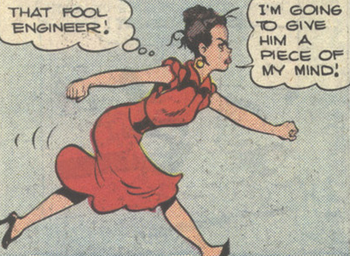
Madame Triple-X is a ruthless spy working for the American government, although Donald and his nephews don't realize that "for the American government"-part until they've caused her lots of trouble first.
- Anti-Hero: Working for the side of "good" (that contextually being the USA), but having some really harsh methods to accomplish her goals. She even causes another spy to commit suicide.
- Blonde, Brunette, Redhead: If you consider her expy status with Madames X and XX.
- Expy: The name "Madame Triple-X" betrays that Barks had Madames X and XX in mind when designing her. You can guess why her name isn't Madame XXX. She also has an Expy herself in Goldfeather from DuckTales, seeing as how "The Duck Who Knew Too Much" appears to take some cues from "Dangerous Disguise".
- Femme Fatale Spy: Not particularly relevant to the events of the story, but Madame Triple-X does fit the trope.
The Phantom of the Notre Duck
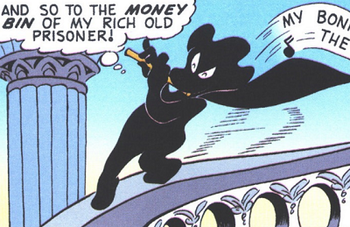
An old man living in the Notre Duck Cathedral.
- Affably Evil: The Phantom bothers the Ducks only to get his hands on more coins so he can finish his miniature cathedral made of coins within the years he's still got left. He does not mean them harm even if some dangerous situations are created.
- Atlantis: He actually found it, not in the sea but in the desert, and, aside for a brief period in the Twenties, lived there most of his life
- Composite Character: The Fantomius story "Notre Duck" reveals his identity as Henry Quackett, Fantomius' older brother.
- The Engineer: His job before moving to Atlantis. He also designed Notre Duck himself, and directed the works for a while before going to Atlantis.
- The Faceless: Until the very end of his one comic story, he goes around in a full-body black costume complete with Badass Cape. Only one panel shows his face.
- Identical Stranger: To Scrooge. Not really: it's a mask.
- Miniature Senior Citizens: He was a lot taller in the Twenties.
- "Not So Different" Remark: Scrooge pulls this on the Phantom when he finds out why the Phantom was after his money. Scrooge likes the miniature cathedral project and points out that had the Phantom just asked he'd gladly lent him all the coins needed if he'd be allowed to help in the project.
- Phantom Thief: As long as he's within the cathedral's grounds, he's near uncatchable. It required teamwork from five ducks and the Woodchucks' dog to corner him. The only thing he steals are coins from the wishing fountain and only because he needs them for art.
- Back in the Twenties he stole much more (in addition to the coins), as he needed them to rebuild Atlantis.
- Secret Identity: Henry Quackett, Fantomius' older brother.
- Shout-Out: The Phantom of the Notre Duck is a combo-reference to The Hunchback of Notre Dame and The Phantom of the Opera.
- The Trickster: His superior knowledge of the Notre Duck Cathedral and confident acrobatics are put to good use keeping the Ducks busy. Several times, he lets them think they've got the drop on him just to make it more fun when he jumps out of reach or turns the tables.
- Walking Spoiler: Due the reveals from "Notre Duck".
Wild Bill Trueshot

The sheriff of Last Gasp whose ageing process stopped after a fall in 1872.
- The Ageless: He stopped ageing in 1872, 83 years before the events of his debut comic, due to a fall in the mine shaft. The fall also gave him hiccups that wouldn't stop. Given that at the end of "The Ghost Sheriff of Last Gasp" he is cured of them, his ticker might have restarted too.
- Hiccup Hijinks: As written above, Trueshot suffered from perpetual hiccuping for 83 years. It's the reason why Last Gasp is deserted too: he chased everyone away because he was afraid his ailment would negatively affect his reputation if anyone found out. In the end, he is cured by the sudden appearance of a (to the eye) heavily armed Donald, who thought the sheriff's ghost had abducted his nephews.
- "Scooby-Doo" Hoax: To avoid spending the rest of his life as "Wild Bill Hiccup", Trueshot fakes his death from the fall and pretended to have returned as a ghost. The citizens of Last Gasp fled out of fear and he's been doing the same since to chase off tourists too. In modern times, at least, he's got the entire town rigged with cords, secretl panels, secret shafts, and what-not to make his ghost act believable.
- The Sheriff: Used to be this to Last Gasp. By his own words, he was one of the best and well-respected.
